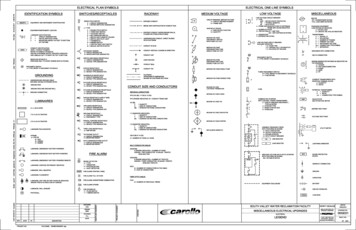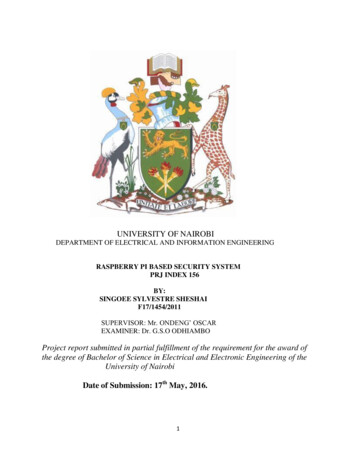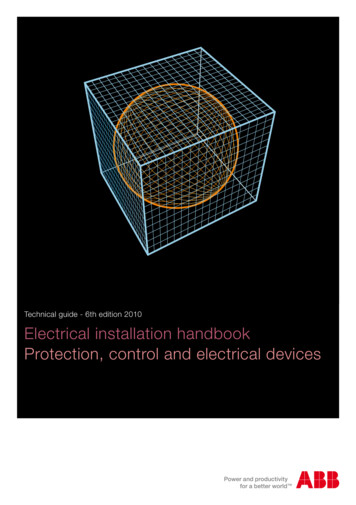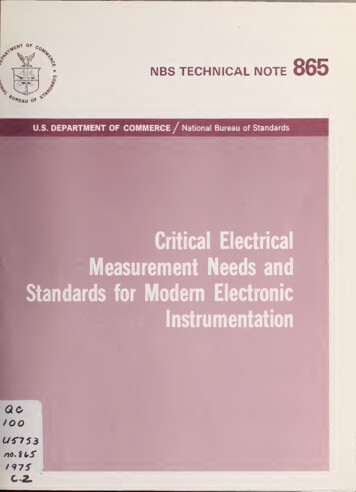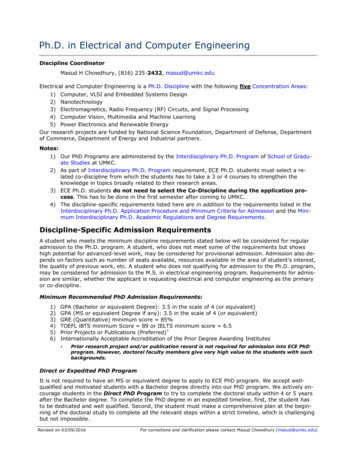
Transcription
Ph.D. in Electrical and Computer EngineeringDiscipline CoordinatorMasud H Chowdhury, (816) 235-2432, masud@umkc.eduElectrical and Computer Engineering is a Ph.D. Discipline with the following five Concentration Areas:1) Computer, VLSI and Embedded Systems Design2) Nanotechnology3) Electromagnetics, Radio Frequency (RF) Circuits, and Signal Processing4) Computer Vision, Multimedia and Machine Learning5) Power Electronics and Renewable EnergyOur research projects are funded by National Science Foundation, Department of Defense, Departmentof Commerce, Department of Energy and Industrial partners.Notes:1) Our PhD Programs are administered by the Interdisciplinary Ph.D. Program of School of Graduate Studies at UMKC.2) As part of Interdisciplinary Ph.D. Program requirement, ECE Ph.D. students must select a related co-discipline from which the students has to take a 3 or 4 courses to strengthen theknowledge in topics broadly related to their research areas.3) ECE Ph.D. students do not need to select the Co-Discipline during the application process. This has to be done in the first semester after coming to UMKC.4) The discipline-specific requirements listed here are in addition to the requirements listed in theInterdisciplinary Ph.D. Application Procedure and Minimum Criteria for Admission and the Minimum Interdisciplinary Ph.D. Academic Regulations and Degree Requirements.Discipline-Specific Admission RequirementsA student who meets the minimum discipline requirements stated below will be considered for regularadmission to the Ph.D. program. A student, who does not meet some of the requirements but showshigh potential for advanced-level work, may be considered for provisional admission. Admission also depends on factors such as number of seats available, resources available in the area of student's interest,the quality of previous work, etc. A student who does not qualifying for admission to the Ph.D. program,may be considered for admission to the M.S. in electrical engineering program. Requirements for admission are similar, whether the applicant is requesting electrical and computer engineering as the primaryor co-discipline.Minimum Recommended PhD Admission Requirements:1)2)3)4)5)6)GPA (Bachelor or equivalent Degree): 3.5 in the scale of 4 (or equivalent)GPA (MS or equivalent Degree if any): 3.5 in the scale of 4 (or equivalent)GRE (Quantitative) minimum score 85%TOEFL iBTS minimum Score 89 or IELTS minimum score 6.5Prior Projects or Publications (Preferred)*Internationally Acceptable Accreditation of the Prior Degree Awarding Institutes Prior research project and/or publication record is not required for admission into ECE PhDprogram. However, doctoral faculty members give very high value to the students with suchbackgrounds.Direct or Expedited PhD ProgramIt is not required to have an MS or equivalent degree to apply to ECE PhD program. We accept wellqualified and motivated students with a Bachelor degree directly into our PhD program. We actively encourage students in the Direct PhD Program to try to complete the doctoral study within 4 or 5 yearsafter the Bachelor degree. To complete the PhD degree in an expedited timeline, first, the student hasto be dedicated and well qualified. Second, the student must make a comprehensive plan at the beginning of the doctoral study to complete all the relevant steps within a strict timeline, which is challengingbut not impossible.Revised on 03/09/2016For corrections and clarification please contact Masud Chowdhury (masud@umkc.edu)
Clarification of Minimum Requirements and Decision ProcessAcademic PreparationThe applicant must have a bachelor and/or a master’s degree in electrical and/or computer engineering,electronics, communications engineering or any other field requiring substantial training in at least oneof the above fields and in mathematics with a GPA of 3.5 or better, cumulative as well as in the majorfield; and a GPA of 3.5 or better in all post-baccalaureate or post-master's degree work.Aptitude for Advanced WorkThe student must demonstrate an aptitude for advanced-level work through national/internationalstandardized examinations such as the GRE. The expected performance level is the 85th percentile in thequantitative portion of the GRE examination. In rare occasion, ECE PhD Discipline Coordinator exempts GRE requirement for students with outstandingpublication or scholarly records in internationally renowned journals, conferences or similar forums.Proficiency in EnglishThe student must demonstrate his or her proficiency in oral and written communication in Englishthrough national/international standardized English examinations such as TOEFL, verbal portion of theGRE, etc. Because of this test, the student may be required to improve his or her oral and written communication in English before enrollment in the courses of the chosen disciplines. For students with a North American (USA and Canada) B.S. or M.S. degree the English Proficiency requirement is exempt.How a PhD Applicant Can Request for the Waiver of any Test Score?As mentioned above, under special circumstance a PhD applicant can request for the waiver of any test(GRE/TOEFL/IELTS) score. Usually the GRE waiver request is granted for students who have alreadydemonstrated outstanding performance in research or other scholarly activities prior to applying to UMKCfor graduate admission. Applicants must talk to the respective Ph.D. Discipline Coordinator BEFORE requesting a waiver for the official test score requirements. After talking with the Coordinators, a waiverrequest can be submitted in writing through the Supplementary Interdisciplinary Ph.D. Application site(iSAP). Choose “Uploads” from the left-hand menu, then “Add files” to upload your waiver request in aPDF format. Choose “Other” for the document type listed in the drop down menu, then click “Start” to addthe TOEFL/IELTS/GRE waiver request to your application.Recommendation LettersThe student must provide at least three recommendation letters from professors from his or her previous institution(s). If the applicant has been out of school for several years, recommendation letters fromhis or her supervisors (technical) will be acceptable. However, even in this situation, a recommendationletter from his or her last academic institution is highly recommended. A recommendation from a facultymember in the Computer Science Electrical Engineering (CSEE) Department at UMKC must be providedif the student has taken courses from or worked with the CSEE faculty.Statement of Goals and ObjectivesThe applicant must provide a 250 to 500 words essay on his/her goals and objectives of pursuing thePh.D. in the chosen fields.Prior Research Projects and Publications (Preferred but not Required)The applicant is encouraged to submit evidence of prior research projects and/or publications (if any).Admission at an Advanced LevelAn applicant who has already completed significant graduate coursework (15 or more semester hours ofpost-master's work or 30 or more hours of post-bachelor's work) toward a Ph.D. at another institutionmust provide reasons for changing institutions. The applicant must also provide a letter of endorsementfrom a doctoral faculty member in electrical and computer engineering indicating their willingness to bethe student's research adviser.Revised on 03/09/2016For corrections and clarification please contact Masud Chowdhury (masud@umkc.edu)
PhD Admission Decision ProcessPhD admission is primarily based on individual doctoral faculty member’s needs and preferences. Therole of ECE PhD Discipline Coordinator is to ensure that PhD applicants satisfy the minimum requirements (GPA, GRE, TOEFL/IELTS, reputation of prior degree awarding institutes and other scholarlyachievements). If the requirements are satisfied and a doctoral faculty member accepts the newapplicant only then the PhD Coordinator takes a positive decision about a particular applicant. In rareoccasion, we bring exceptionally well-qualified students without the acceptance from a doctoral faculty.Communication with our Doctoral Faculty MembersIn addition to reviewing the academic credentials of a new PhD applicant, many of our faculty membersprefer interviewing the student before making any decision. Therefore, we strongly advise new PhDapplicants to contact our doctoral faculty members in the areas of their research interests before or after starting the application process. However, it is not required that every PhD applicantmust contact a relevant doctoral faculty member prior to the application. Whenever we receive a newPhD application we share the information with all ECE doctoral faculty members for their consideration.ECE Doctoral Faculty Members and Research Areas (please check our websites for updates):1) Dr. Deb Chatterjee, Associate Professor (Email: ChatD@umkc.edu)Research Areas: Computational electromagnetics. Ultra-wide-band arrays for application to radarand biomedical imaging. RF propagation path loss modeling for wireless communications. Signal integrity, EMI/EMC analysis of high-speed interconnects. Integration of sensor and platform — antenna placement analysis. Applications of graphene and carbon nanotube antennas.2) Dr. Ghulam Chaudhry, Department Chair and Professor (Email: ChaudhryG@umkc.edu) Research Areas: Computer arithmetic. Embedded systems design. HDL-Based Design. FPGA. VLSIdesign and Quantum-dot cellular.3) Dr. Masud Chowdhury, Associate Professor and ECE PhD Discipline Coordinator (Email:masud@umkc.edu), Research Areas: High-performance issues of VLSI circuits. Emerging postsilicon device and interconnect technologies for the next generation integrated circuits. Optically reconfigurable VLSI circuits. Carbon Nanotube (CNT), graphene and 2D Nanomaterial based logic,memory, sensor, optoelectronic, and energy generation and storage devices.4) Dr. Reza Derakhshani, Associate Professor (Email: derakhshanir@umkc.edu), ResearchAreas: Computational intelligence with applications in biometrics and biomedical signal and imageprocessing, computational imaging, biometric security and liveness detection, deep learning and artificial neural networks.5) Dr. Ahmed Hassan, Assistant Professor (Email: hassanam@umkc.edu), Research Areas: Dr.Ahmed M. Hassan leads the Multidisciplinary and Multiscale Electromagnetics Lab (MMEL). His current research interests include Nano-electromagnetics, Electromagnetics in Biology and Medicine,Nondestructive Evaluation, Experimental Microwave and Terahertz imaging6) Dr. Faisal Khan, Associate Professor (Email: faisal.khan@umkc.edu), Research Areas: Powerelectronics for automotive, renewable sources and implantable circuits, State of health estimation ofpower converters, aging and fault detection using SSTDR.7) Dr. Zhu Li, Associate Professor (Email: lizhu@umkc.edu), Research Areas: Image/Video Analytics, Object and Content Identification, Video Coding and Streaming, Content Delivery Networks.8) Dr. Mostafizur Rahman, Assistant Professor (Email: rahmanmo@umkc.edu), Research Areas:Beyond CMOS computing with emerging nanodevices, and novel integration techniques. Nanoscale3-D integrated circuits. Neuromorphic computing to mimic mammalian brain’s capabilities. Proof-ofconcept nanoscale experimental prototyping. Manufacturing and thermal aware circuit designDoctoral Faculty Members with Joint Affiliation:9) Dr. ZhiQiang Chen, Assistant Professor (Email: chenzhiq@umkc.edu) (Primary: Civil Engineering, Secondary: ECE): Research Areas: Remote sensing, image-based understanding, and theirapplications in emergency response, civil infrastructure, and agricultural engineering.ECE Graduate Faculty Members (can serve as committee member, but not as PhD supervisor):10) Dr. Mahbube Siddiki, Instructor (Renewable Energy and Nanotechnology for Energy Devices)11) Dr. Preetham Goli, Assistant Teaching Professor (Plug-in-Hybrid, Power and Smart Grid)Revised on 03/09/2016For corrections and clarification please contact Masud Chowdhury (masud@umkc.edu)
Qualifying Requirements for Full AdmissionPrerequisite KnowledgeA Ph.D. student selecting Electrical and Computer Engineering (ECE) as the primary (coordinating) Ph.D.discipline is expected to have the level of preparation represented by a four-year undergraduate degreein electrical/computer engineering. The applicant may have received a bachelor's degree or a master'sdegree in computer science, computer engineering, electrical engineering or electronics, or any otherrelated field with substantial training in mathematics.Selection of a Co-Discipline and Suggested Compatible Co-DisciplinesTo broaden the knowledge of the PhD students UMKC Interdisciplinary Ph.D. program requires each student to select a co-discipline closely related to the primary discipline. The following are suggested compatible co-disciplines for ECE students: Computer Science (CS), Telecommunication and ComputerNetworking (TCN), Mathematics, Physics, and Engineering (Civil and Mechanical focus). A codiscipline outside of this list may be considered only in exceptional cases. These co-disciplines require 3or 4 courses to be taken by the ECE Ph.D. students to fulfill the co-discipline requirements.Notes: ECE Ph.D. students do not need to apply to a Co-Discipline at the time of admission.ECE Ph.D. students have to select a co-discipline in the first semester after coming to UMKC.ECE Ph.D. students are advised to consult their primary (ECE) adviser to select an appropriate co-discipline.ECE Ph.D. students can change their co-discipline any time before the comprehensive exam.Transfer of Course CreditNew Ph.D. students with some prior graduate level course works from another university can apply totransfer up to 6 credit hours in each discipline (primary and co-discipline).Alternate Admission CriteriaAn applicant not meeting the minimum admission requirements, or not having sufficient academic preparation (stated above under prerequisite knowledge) for advanced work in the chosen discipline (s),may be considered for provisional admission by the CSEE Departmental Ph.D. committee if the committee sees high potential for advanced work from the rest of the applicant's credentials. Evidence of highpotential might be pertinent work experience, published papers or extremely high achievements in related areas. A student not having an undergraduate degree in electrical and/or computer engineeringmay be admitted provisionally if the admission committee determines that the student has a strong aptitude for research and is willing to take prerequisite courses as determined by the admission committeebased on the student's academic record.Application for an MS Degree while Enrolled in ECE Ph.D. ProgramECE Ph.D. students may apply to receive an MS degree upon passing the qualifying and comprehensive examsprovided that the coursework required for MS degree under course only option is completed. This is a very goodoption for students in ECE Direct Ph.D. Program. However, this is subject to primary Ph.D. supervisor’s approval.Note: If an ECE Ph.D. student fails to pass the Qualifying Exam in two attempts or cannot successfully completethe Comprehensive Exam, the student will not be allowed to apply for transfer to the MS program or applyto receive an MS degree even if the coursework required for MS degree under course-only option is completed. Please consult your ECE Ph.D. supervisor and/or ECE Ph.D. Discipline Coordinator for details.Core Program RequirementsThe amount of work required for the Ph.D. depends on the student's level of preparation. For example,a student entering the Ph.D. program after earning a bachelor's degree may expect to do significantlymore work compared to a student who enters after earning a master's degree.Electrical and Computer Engineering as a Co-Discipline Students who choose ECE as a co-discipline need to take 3 ECE graduate courses (9 credit hours).Students who choose ECE as a co-discipline do not need to take the ECE PhD Qualifying Exam.CS, TCN, Engineering and Physics PhD students are automatically eligible for ECE Co-Discipline.Revised on 03/09/2016For corrections and clarification please contact Masud Chowdhury (masud@umkc.edu)
Fulltime Status and Doctoral Residency RequirementUS Domestic students can enroll into any number of credit hours per semester during the regular academic year (Fall and Spring). According to US Federal Law, international students are usually requiredto enroll in 9 credit hours per semester during the regular academic year (Fall and Spring) to maintainfulltime (visa) status. However, for international graduate (PhD and MS) students with 50% FTE (20hours per week) appointments as Graduate Research/Teaching Assistants the requirement is 6 credithours of enrolment per semester for full time equivalence. Enrolment is not required in Summer.Interdisciplinary Ph.D. students must satisfy the doctoral residency requirement by satisfactory completion of at least 18 credits in no more than 24 consecutive months.Financial AidVarious forms of financial aid (such as graduate research assistantships, graduate teaching assistantships, graduate fellowships) are available through the Computer Science and Electrical EngineeringDepartment and the School of Graduate Studies. Contact the discipline coordinator for more information.Most of our PhD students are funded through Graduate Research Assistantship (GRA) and/or Graduate Teaching Assistantship (GTA). GRA support is provided by individual doctoral faculty membersfrom their research grants. GTA support comes from Department Chair's instructional fund. However,the GTA support is also provided based on the recommendation of the Ph.D. adviser. Department Chairnormally honors the requests for GTA support if there are available GTA slots. Therefore, every PhD student must have a faculty adviser to get funding in the form of GRA or GTA. Once a PhD student is admitted we (the Department Chair and the doctoral faculty members) will try our best to provide fundingto the student throughout the PhD study. However, the applicants must keep in mind that the numberof funding slots (GRA and GTA) for the PhD students are not unlimited. The supports are provided basedon respective faculty adviser's recommendations and Department Chair's needs. The awarding of GRAand GTA funding is a competitive process. The students are required to maintain high academic standingand demonstrate strong research performance to get continuous support throughout the PhD study. OurDepartment’s policy is to provide support to as many PhD students as possible.Additionally, UMKC School of Graduate Studies provide many different types of fellowships, awards andscholarships to qualified graduate students through a competitive selection process. Please visit thewebsite of the School of Graduate Studies for further details.Note: If a student receives financial aid in the form of GTA/GRA from the CSEE Department or its doctoral faculty members after the full admission and enrolment into ECE Ph.D. program, the studentmust complete the doctoral study. If a funded Ph.D. student decides to leave the program at anystage before the completion no terminal MS or equivalent degree will be awarded.Monthly Stipend for Ph.D. Students with GRA/GTA AppointmentsPh.D. students with 50% FTE (20 hours per week) appointments as GRA/GTA will receive a stipend ofaround 6000 (subject to availability of funds) per semester during the Fall and Spring semesters. Thisstipend will be paid in 4 or 5 monthly installments. All GRA/GTA appointments (if awarded) are for oneregular academic year (Fall and Spring) for the new students. Beyond the first year, the GRA/GTA supports are subject to availability and performance. There is no guaranteed financial support for theSummer semester.Tuition Rates and CreditsUMKC offers in-state tuition rate to all (domestic and international) Ph.D. students. Ph.D. students with50% FTE (20 hours per wee
1) Our PhD Programs are administered by the Interdisciplinary Ph.D. Program of School of Gradu-ate Studies at UMKC. 2) As part of Interdisciplinary Ph.D. Program requirement, ECE Ph.D. students must select a re-lated co-discipline from which th
